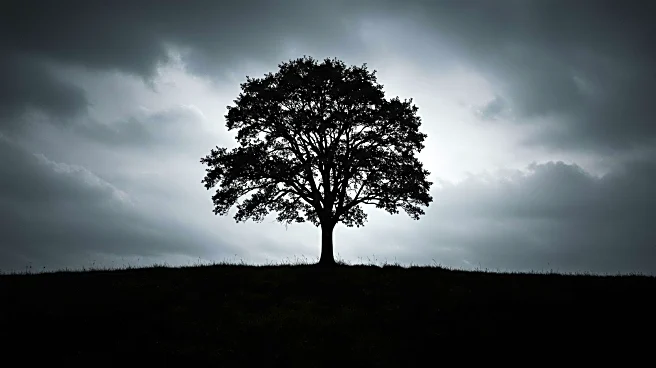What's Happening?
The film 'Went Up the Hill,' directed by Samuel Van Grinsven, is a ghost story that delves into themes of love, grief, and unfinished business. The narrative centers around a couple named Jack and Jill, portrayed by Dacre Montgomery and Vicky Krieps, who are haunted by the ghost of Elizabeth, Jill's deceased wife and Jack's estranged mother. The film is set against the backdrop of a minimalist, remote New Zealand house, where Elizabeth's funeral takes place. The story unfolds as Jack arrives unannounced at the funeral, leading to a series of events that reveal the complex relationships between the characters. The film is noted for its atmospheric visuals and the nuanced performances of its lead actors.
Why It's Important?
The film 'Went Up the Hill' offers a unique take on the ghost story genre by focusing on the emotional and psychological aspects of grief and loss rather than traditional horror elements. This approach provides a fresh perspective on how individuals cope with the death of loved ones and the lingering impact of unresolved relationships. The film's exploration of these themes may resonate with audiences who have experienced similar feelings of loss and mourning. Additionally, the film's setting and cinematography contribute to its overall impact, highlighting the isolation and introspection that often accompany grief.
What's Next?
As 'Went Up the Hill' continues to be screened, it may spark discussions about the portrayal of grief and the supernatural in cinema. The film's unique approach could influence future filmmakers to explore similar themes in innovative ways. Audience reactions and critical reviews will likely shape the film's reception and its place within the genre. The performances of Dacre Montgomery and Vicky Krieps may also garner attention, potentially leading to further opportunities for the actors in similar roles.
Beyond the Headlines
The film's exploration of grief and haunting raises questions about the nature of memory and the ways in which individuals process loss. By presenting the ghost of Elizabeth as a metaphorical presence rather than a literal one, the film invites viewers to consider the psychological impact of unresolved emotions. This approach challenges traditional narratives of the supernatural and encourages a deeper understanding of the human experience of mourning.










